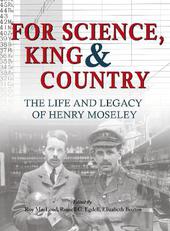
|
For Science King & Country: The Life and Legacy of Henry Moseley
Paperback / softback
Main Details
| Title |
For Science King & Country: The Life and Legacy of Henry Moseley
|
| Authors and Contributors |
Edited by Professor Roy MacLeod
|
|
Edited by Professor Russell G. Egdell
|
|
Edited by Dr Elizabeth Bruton
|
| Physical Properties |
| Format:Paperback / softback | | Pages:328 | | Dimensions(mm): Height 234,Width 170 |
|
| Category/Genre | First world war
Physics |
|---|
| ISBN/Barcode |
9781910500712
|
| Classifications | Dewey:530.092 |
|---|
| Audience | |
|---|
|
Publishing Details |
| Publisher |
Unicorn Publishing Group
|
| Imprint |
Uniform Press
|
| Publication Date |
15 September 2018 |
| Publication Country |
United Kingdom
|
Description
Even in his lifetime, Henry Gwyn Jeffreys Moseley,who died at Gallipoli in 1915, was widely regarded as the most promising British physicist of his generation.Had he survived, he could well have won the Nobel Prize for Physics in 1916. His death provoked in Britain a reassessment of the role that scientists might play in war. This book of essays by eleven scholars is a commemoration of his life, his work, and his ongoing legacy. Linked with the 2015 exhibition 'Dear Harry...Henry Moseley: A Scientist Lost to War, held at the Oxford Museum of the History of Science. This book charts his brief career, military service and his lasting influence in a field of science which is rapidly developing, and foreshadowing the innovation of new materials. For Science, King and Country speaks to both historians and to scientists, and draws on a wealth of newly discovered archival material, artefacts, and interpretations. Together, it presents a comprehensive account of a young scientist whose brief but mercurial career led the way to a new understanding of nature,and to shaping the future of chemistry and physics ever since.
Author Biography
Edited by Professor Roy MacLeod, Professor Emeritus of Modern History, University of Sydney, Professor Russell G. Egdell, Emeritus Professor of Chemistry, University of Oxford and Dr Elizabeth Bruton, Curator of Technology and Engineering at The Science Museum, London.
Reviews"Like many commemorative events of the Great War, this collective volume demonstrates that memory is not always celebratory and provides historians with opportunities to revisit heroic vignettes. Thanks to the heterogeneous backgrounds of the various contributors, this biographical volume is a welcome complement to the standard biography by John Heilbron (1974). . . . It opens up broad new perspectives on the relations between physics and chemistry in the early twentieth century."-- "Metascience"
|